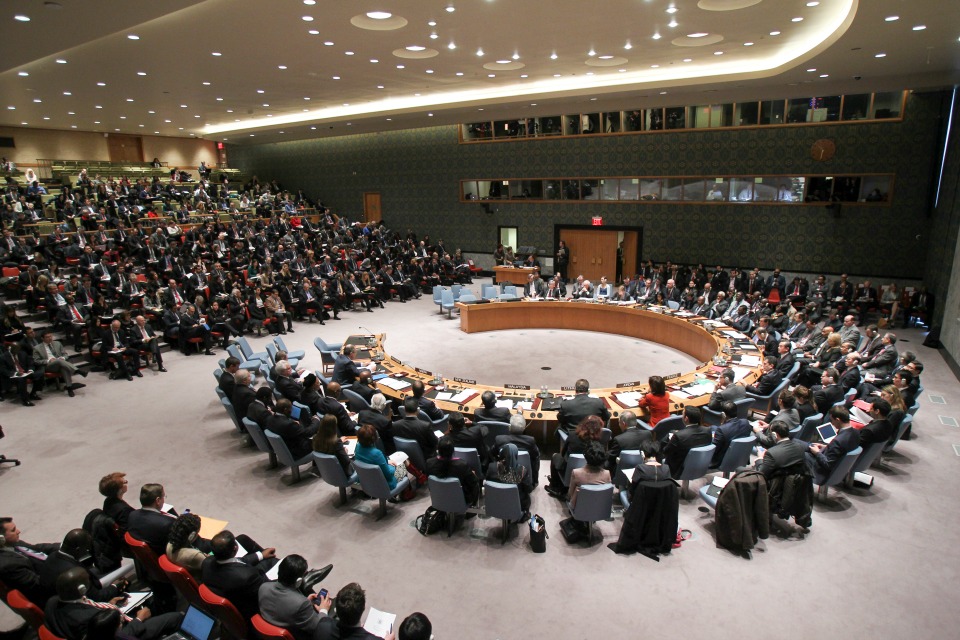"OSCE Monitoring Mission in Ukraine is essential to the implementation of the Minsk agreements"
Statement by Ambassador Mark Lyall Grant of the UK Mission to the UN at the Annual OSCE Debate

Thank you Mr President and I thank you first Deputy Prime Minister Dacic for your briefing as OSCE Chair-in-Office. As you said, your chairmanship comes during the worst crisis of European security since the end of the Cold War. I shall therefore focus my remarks on Ukraine, and the OSCE’s role in that crisis.
Over the past months, the work of the OSCE Special Monitoring Mission, led by Ambassador Apakan, has been invaluable in giving visibility to the challenges to peace and security that persist in eastern Ukraine. I pay tribute to the work of the OSCE and express our full support for the mission and for Heidi Tagliavini, the Special Representative of the Chair-in-Office for Ukraine. We believe that its role should be greatly strengthened. Mr President,
Last week, this Council adopted resolution 2202 endorsing the package of measures for implementation of the Minsk agreements and underlining the importance of achieving a comprehensive ceasefire in eastern Ukraine. However, in the days since the agreement was signed in Minsk on 12 February, the OSCE Special Monitoring Mission has observed continuous breaches of the ceasefire that threaten to destabilise eastern Ukraine further, and undermine the Minsk agreements in their entirety.
Minsk called for a ceasefire to begin on 15 February and for the withdrawal of heavy weaponry to start from 16 February. Yet within 40 minutes of coming into effect, the ceasefire was shattered by a Russian-backed separatist offensive on Debaltseve. On 19 February, Ukrainian forces withdrew from the city. Scores of Ukrainian soldiers were left dead or injured.
The continued presence of Russian military hardware, including Uragan rocket launchers and T-72 tanks around Debaltseve, shows that Russia’s commitment to withdraw foreign military formations – which was a key element of the Minsk agreements - has been disregarded. The OSCE report that convoys are still crossing the international border and the shelling persists in Donetsk and Luhansk in clear violation of the ceasefire.
There have been some bright spots. We welcome the exchange of a number of prisoners this weekend between the Ukraine Armed Forces and Russian-backed separatists. However, many more remain in detention, including the Ukrainian pilot, Nadia Savchenko. And clearly this is not yet enough.
Mr President,
We welcome efforts by the OSCE Monitoring Mission to fulfil its mandate in difficult circumstances. We were gravely concerned by reports of aggressive separatist behaviour towards the Mission on 22 February, when a separatist commander at the Kievskyi checkpoint in Donetsk city threatened to kill the monitors. On the same day, an SMM Unmanned Aerial Vehicle attempting to monitor compliance with the Minsk Package in the area surrounding Donetsk airport was deliberately and consistently jammed. Obstruction and threats to the Mission are unacceptable. This Council fully supports the work of the OSCE Monitoring Mission and we should all unequivocally condemn the acts of separatists attempting to impede their work.
Mr President,
This Council has seen this pattern of behaviour before. We recall how the separatists cynically and systematically undermined the September Minsk accord. We recall how the line of contact was ignored and redrawn as the separatists seized an additional 550 square kilometres of Ukrainian territory. And we recall how indiscriminate shelling of civilians brought the conflict to Mariupol and Volnovakha.
As a signatory to the Minsk agreements, Russia needs to ensure that the separatist forces respect the ceasefire. And it must fulfil its own commitment to fully withdraw the heavy weapons it has supplied them with and its military formations from Ukrainian territory. Russian influence can also help expedite the full exchange of prisoners and guarantee the humane treatment of any soldiers currently detained. And it can also permit the OSCE Monitoring Mission to continue its important work in monitoring the ceasefire and other provisions of the Minsk agreements.
But so far we have seen few signs of Moscow’s willingness to engage constructively. Russia has refused to allow the expansion of the OSCE Border Observation Mission to enable full monitoring of the international border, leaving hundreds of kilometres of border open to the flow of weapons and soldiers. And it continues to block the OSCE, including the Office for Democratic Institutions and Human Rights and the High Commissioner on National Minorities, from any access to Crimea.
Mr President,
Nearly a year on from the illegal annexation of Crimea, we are faced with a crisis that has expanded far beyond the Black Sea and now threatens the security of the region, and the credibility of this Council. The pattern is familiar from Russian behaviour in Georgia and Moldova. Agreements are reached, ceasefires arranged, territorial gains consolidated. In Ukraine, these agreements are systematically breached within days, the violence resumes and the push for more territory begins again.
Quite apart from the terrible human costs, these actions also have profound consequences for international relations. It is in no-one’s interests to return to an era where agreements between leaders become worthless. Organisations like the OSCE and the UN were founded on the principles of dialogue and a respect for peace and stability. The Serbian Chairmanship-in-Office has made welcome efforts to bolster respect for OSCE principles despite continuing efforts by some states to undermine them. This Council must follow this example and ensure that further breaches of Minsk, and further erosion of the principles that this Council shares, are met with clear consequences. We will be working with our EU partners to ensure that sanctions remain in place until Russia demonstrates a clear commitment to these fundamental principles.
I thank you.